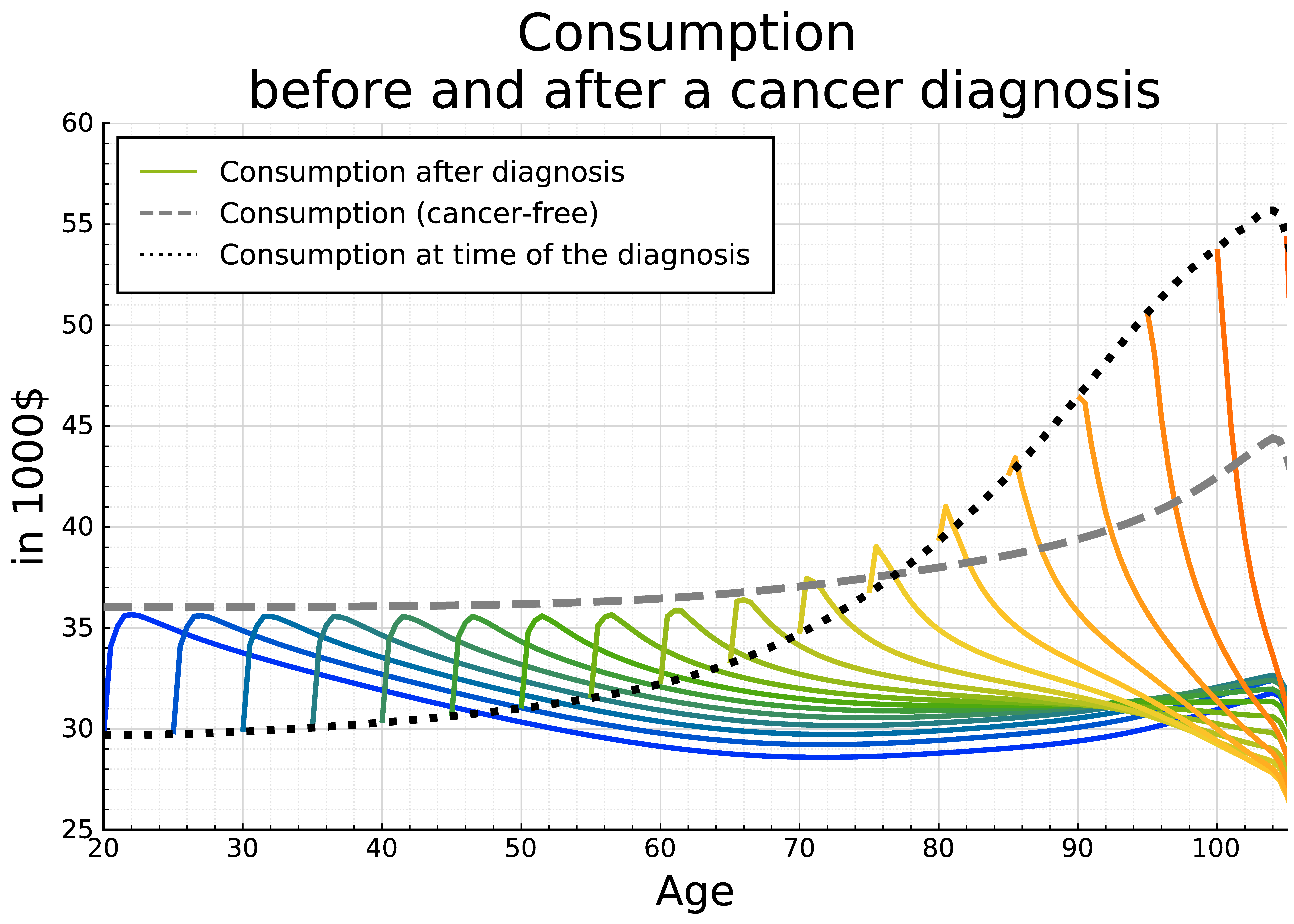
Health shocks are investigated by researchers in the EF Program from multiple angles using both modelling and statistical approaches. In one project theoretical findings are used to assess the impact of a potential life-altering health shock on the consumption and health expenditure decisions over the whole individual life-cycle. For a numerical example the authors calibrated the model for a potential cancer diagnosis for an individual in the US in the 2010s. The second project conducted a study investigating the relationship between socioeconomic environment (SEE) and survival after ST-segment elevation myocardial infarction (STEMI) separately for women and men in the City of Vienna, Austria.
Optimal consumption before and after cancer diagnosis for all possible ages at diagnosis
Modelling health shocks
Freiberger, Kuhn and Wrzazcek started their work on health shocks within the FWF project “Life-cycle behaviour in the face of large shocks to health” (P 30665-G27). This work focuses on the modelling of large shocks to individual health over the life-cycle.
Most models on the life-cycle utilization of health care consider the expected development of an individuals health. However, health shocks with significant impact (e.g. the onset of a chronic disease or life-threatening accidents) should not be averaged into a mean value, as they can put the life-course onto a different trajectory. This paper presents a dynamic optimal control framework incorporating a stochastic health shock with individuals allocating their resources to consumption and various types of health care over their life-cycle. We distinguish between general health care and shock specific prevention, acute and chronic care. We investigate the optimal decisions (with respect to consumption, savings and health care) made in anticipation of a potential health shock and the optimal reaction to all possible shock scenarios. Furthermore, we extend the value of life concept to other aspects of individual health and illustrate our findings by calculating a numerical solution calibrated to an individual facing a potential cancer diagnosis in the US. For the numerical solution, we use the 2SOCS model, which allows for an efficient solution of two-stage optimal control problem with random switching time.
Freiberger, M., Kuhn, M., & Wrzaczek, S. (2023). Modeling health shocks. IIASA Working Paper. Laxenburg, Austria: WP-23-002
Socioeconomic environment and survival in patients after ST-segment elevation myocardial infarction (STEMI): a longitudinal study for the City of Vienna
Objectives: This study investigates the relationship between socioeconomic environment (SEE) and survival after ST-segment elevation myocardial infarction (STEMI) separately for women and men in the City of Vienna, Austria.
Design: Hospital-based observational data of STEMI patients are linked with district-level information on SEE and the mortality register, enabling survival analyses with a 19-year follow-up (2000-2018).
Setting: The analysis is set at the main tertiary care hospital of the City of Vienna. On weekends, it is the only hospital in charge of treating STEMIs and thus provides representative data for the Viennese population.
Participants: The study comprises a total of 1481 patients with STEMI, including women and men aged 24-94 years.
Primary and secondary outcome measures: Primary outcome measures are age at STEMI and age at death. We further distinguish between deaths from coronary artery disease (CAD), deaths from acute coronary syndrome (ACS), and other causes of death. SEE is proxied via mean individual gross income from employment in each municipal district.
Results: Results are based on Kaplan-Meier survival probability estimates, Cox proportional hazard regressions and competing risk models, always using age as the time scale. Descriptive findings suggest a socioeconomic gradient in the age at death after STEMI. This finding is, however, not supported by the regression results. Female patients with STEMI have better survival outcomes, but only for deaths related to CAD (HR: 0.668, 95% CIs 0.452 to 0.985) and other causes of deaths (HR: 0.627, 95% CIs 0.444 to 0.884), and not for deaths from the more acute ACS.
Conclusions: Additional research is necessary to further disentangle the interaction between SEE and age at STEMI, as our findings suggest that individuals from poorer districts have STEMI at younger ages, which indicates vulnerability in regard to health conditions in these neighbourhoods.
Spitzer, S., di Lego, V., Kuhn, M., Roth, C., & Berger, R. (2022). Socioeconomic environment and survival in patients after ST-segment elevation myocardial infarction (STEMI): a longitudinal study for the City of Vienna. BMJ Open 12 (7) e058698. 10.1136/bmjopen-2021-058698.




